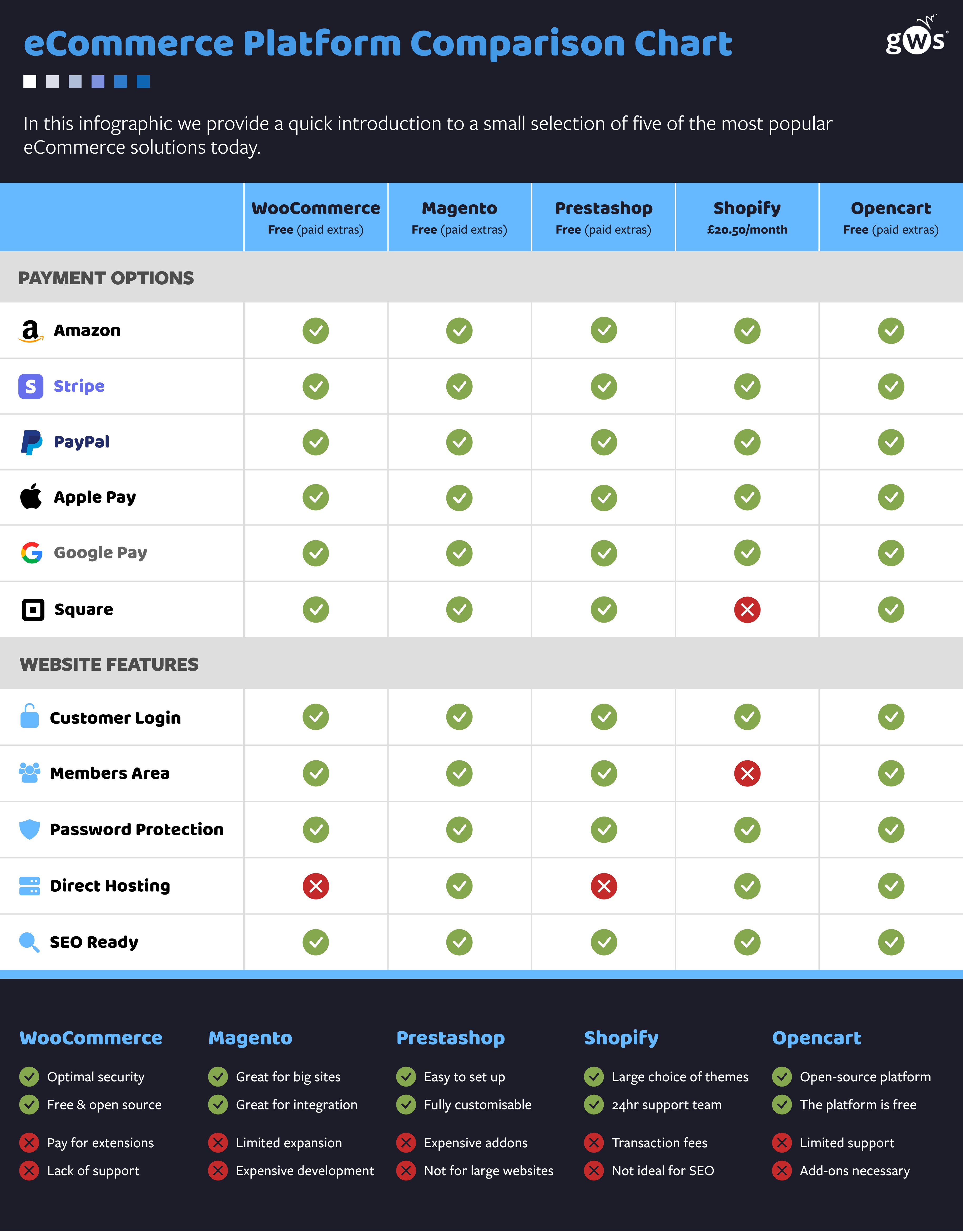We have previously given a more detailed overview of the four main ways that eCommerce functionality can be integrated into a website.
In this article, we provide a quick introduction to a small selection of five of the most popular eCommerce solutions today. These are ones we have either used to develop client websites, or have managed and provided support for. You will find some others mentioned in our earlier article linked above.
WooCommerce (Free with paid extras)

Woocommerce is a popular third-party e-commerce plug-in available for the most popular content management system in existence, Wordpress. It can be extended with extra plug-ins to offer a wide variety of features, and has achieved good market share as the most popular e-commerce add-on for Wordpress since it was introduced in September 2011.
Woocommerce is probably best-suited to small and medium-sized shops with standard features and without integration requirements. It does not have as many features built in as some alternatives, and can be slower if you have a lot of products and product options, or a high volume of sales. If you need to install a lot of plug-ins to get all the features you need, this can affect site stability. If you require a wider range of features out of the box, or an admin area that is purely designed for e-commerce, then one of the dedicated e-commerce solutions like Prestashop or Magento may be more appropriate - but if you have a Wordpress website already, then WooCommerce is generally the clear choice, as it allows you to add a shop to your existing website.
Magento (Free with paid extras)

Magento is an open-source content management system built for e-commerce, and ideally suited to adding custom business logic or integrations to your online store. The free version, called Magento Open-Source, can be tailored precisely to the needs of a web shop, and more features (including ones for business-to-business shops) can be added with extensions available at a variety of price points. Magento requires skilled developers, and is generally more expensive to develop than other platforms, but it does offer an enterprise-level feature set and great expandability. The admin area is designed around e-commerce requirements, but is not as user-friendly as Wordpress especially for non-product content management.
Magento was first launched in 2007, and was overhauled for Version 2, released in November 2015. Since then, it has been acquired by Adobe. It has a reputation as a 'heavyweight' system, and is normally hosted on a dedicated server or hosting optimised for Magento. Version 2 features excellent support for caching, and will run very fast when configured correctly.
Paid versions of Magento called Magento Mid-Market and Magento Enterprise offer more features including for B2B but the yearly costs, with a component based on transaction value, are high. Unless the extra features and the B2B feature set are needed or a company is looking to manage its online shop in-house with direct support from Adobe, the free version is probably a better choice.
Prestashop (Free with paid extras)

Prestashop is a popular open-source CMS for e-commerce. It is designed to be easy to use for non-technical content managers, much like Wordpress. It stands somewhere between WooCommerce and Magento in terms of complexity, flexibility and cost. It can be more appropriate than Magento where the flexibility and feature set that Magento provides is not needed, or where cheaper development costs are wanted.
The basic installation is free; themes, plug-ins and payment processing modules generally come at extra cost. It can be extended like Magento.
Prestashop was first developed in France in 2005 as a school project. Release 1.0.0 was published in August 2008, and version 1.7.8 was released in May 2021.
Shopify (£20.50/month)

Shopify is a paid e-commerce solution that operates on a monthly rental model (sometimes known as 'software-as-a-service'). It's designed to be very easy to use for a non-technical store manager, and has become an extremely popular application because of its attractive templates, its many built in features, its ease of use and low cost of entry.
However, the ongoing costs, transaction fees and lack of flexilibility compared with other e-commerce options mean it is worth weighing up whether you will have to make too many compromises if you choose Shopify for your online store. We have seen cases where a move to Shopify has resulted in more trade-offs and lost features than expected, and much more manual data insertion by the store managers than promised.
Shopify is generally a good choice where you have relatively straightforward requirements, limited product variations and simple shipping choices, and do not need to have custom features added. More expensive versions of Shopify are available but generally the cost of those makes the alternatives like Magento more attractive.
With Shopify, you are paying for the convenience and speed of store set-up, and for a system where you don't have to worry about hosting or security updates - meaning there is less to worry about for the store owner and developers.
Shopify is owned by a company that was founded and remains based in Canada. The first version of the CMS went public in June 2006. By July 2021, it had reached version 9.29.
Opencart Free (Free with paid extras)

OpenCart is a free open-source e-commerce CMS that was developed by British developer Daniel Kerr in the late 2000s and has since become a popular e-commerce platform with online stores. It is used worldwide but has become especially popular in China, as with other systems it supports a wide range of languages. It reached Version 3 in 2021.
Although it operates as a standalone content management system, OpenCart is also now available as a plug-in to Wordpress, while an OpenCart plug-in for Joomla has been available for some years.
OpenCart is highly customisable, but requires skilled developers to customise it. It is more of a competitor to Prestashop and Magento in terms of its flexibility. It is not such a good option as Shopify or WooCommerce for less technical shop managers who are looking for an easy-to-operate, out-of-the-box solution.

